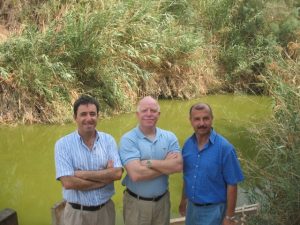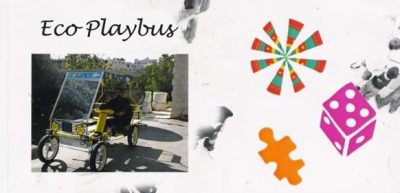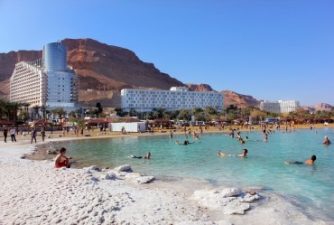 Do you feel that the politics behind environmental issues in Israel-Palestine are being sidelined?
Do you feel that the politics behind environmental issues in Israel-Palestine are being sidelined?
A couple of weeks ago, Green Prophet reported on the news that Israelis and Palestinians were working together to build a restorative eco-park. It was a relatively feel-good piece showing that despite the political conflict, joint projects could be useful in building bridges between the two nations. One commentator, however, felt that our coverage was politically naïve.
H.Shaka remarked: “I appreciate that GP is trying to report on ‘green’ in the whole Middle East, including both Israel and the Arab world, and I have come to see this as a step in the right direction. However, given the strong political drivers in the region, I think GP should aim to be much more politically informed and balanced if it wishes to gain the respect of its readers, at least in the Arab world.”
From me personally, the comment struck a chord. I can see why the commentator would prefer that politics play a bigger role in the way we see green initiatives in the region. I am the first to admit that green campaigners can be a little idealistic about joint Israeli and Palestinian projects, and tend to ignore their political downsides.
I remember speaking to a green Bedouin organisation about such joint projects and they were eager to point out that they are deeply problematic as the partners are in no way equal. They explained that the Israeli side have more say, more influence and a lot more to gain than Palestinian Bedouins, who are almost token players.
Others add, that joint Israeli-Palestinian projects can be seen as ‘normalisation’. That they allow and even encourage greater acceptance of the unfair political situation and distort the oppressor/oppressed relationship between Israel and Palestine. I understand all that. I also understand that not everyone sees the political situation the same way. That the political situation is quite complex and that solutions are not as easy to point out as the problems are.
If you don’t think that joint Palestinian-Israeli projects are fair, does that mean that allowing environmental resources to deteriorate further to make a political stand is the solution? I don’t think I can accept that. There has to be a better option – what that is, isn’t clear right now.
I also have to defend Green Prophet’s openness to discussing these political issues. As well as covering these joint projects, we have reported on less ‘positive’ stories such as Israel’s water apartheid, the dire environmental situation in Gaza and the environmental impact of the conflict. Indeed, the Green Prophet writers are quite a varied bunch of writers and I don’t always agree with my fellow colleagues on issues such as nuclear power, working with corporations, green gadgets and lots more. I also think we don’t need to agree.
All writers are given the freedom to talk about every political issue they feel is important. If coverage appears to be apolitical, I can only guess it’s because writers may feel that there is nothing to gain from bringing up these political issues time and time again. The reader will most probably still believe what they believed when they started reading the article. I know that sound cynical but I am being honest. I have seen how political argument blow up on some websites and blogs and they not only achieve very little but are corrosive too.
I don’t really know how to end the post other than to say that I speak for myself. This is not some attempt to say ‘yes, Green Prophet has it right/wrong’ but rather my personal perspective on things. Yes, I think we need to include politics more in our coverage of green issues in the Middle East. But I can also understand why many of us choose not to. It’s too messy, too complicated and I am not sure that it is what the majority of our readers want.
I guess, now it’s your say.
Do you feel that the political dimensions of environmental issues in Israel-Palestine are being sidelined in our coverage?
And do you want to see more or less politics?
: Image via Michele Benericetti/flickr.
For more on political issues in the environment in the Mideast see:
Israeli Enviro Minister: Please Keep Politics Out of Water!
Jordan Politics Hampers ‘Friends of the Earth Middle East’
Solar Power In The West Bank- Green Progress or Bad Politics?




I also appreciate this open discussion on the role of politics in your reporting, since I know how sensitive the topic of Israeli-Palestinian relations is. I agree with Alice Gray that it’s impossible to ignore the political aspects and that I want to know the behind-the-scenes dynamics of the issues. Thanks to Green Prophet for your reporting.
Thanks everyone. To take this discussion one step further, one of the main obstacles that keeps us from venturing deeply into the background is money! In order to stay honest, we have avoided looking to big corporations for funds to sustain this project. As a result, you should know that Green Prophet contributors are more or less writing out of the goodness of their hearts and not because we can afford to pay a living wage. We are open to ideas for funding so that we can make this platform even more engaging and thoughtful, and – perhaps more importantly – we would love to see the community step up and show support for what we believe is an exceptionally important service.
I second Tafline, thank you Arwa for writing this post and promoting a thoughtful discussion. This is exactly what I was hoping for when I posted the original comment.
Nice article Arwa 🙂
I personally feel that you can’t take politics out of environmentalism. Indeed, ultimately most human politics relate to the environment and the control of environmental resources.
In Israel and Palestine, this holds true, and is even more significant than in many places because there is an active colonisation project going on that uses the environment as a mechanism of control – effectively as a weapon. In the Palestinian Territories in particular, there is practically no environmental issue that is not ensnared in politics – and so if we want to effectively change things, we need to look to the roots of the problems and understand the context.
Look at Palestinian Area C for example. Utterly impossible to ignore the politics when people are denied access to water and electricity – and then when smart solutions such as solar power are found, the government orders the projects to be bulldozed. Let’s not pretend that the Bedouin sector in Israel is faring much better.
In permaculture, when we make a design for a site, we carry out what is called ‘sector analysis’ in which we analyse the influence of different ‘sectors’ (wind/sun/water) on the site. I always tell students here that we also have to map the ‘political’ sector and come up with a strategy to deal with it, or however good our design is, it risks disappearing under the tracks of a bulldozer. With water, the catchphrase is ‘slow, spread and sink’……….perhaps also somewhat appropriate for malignant political influences. But where with water we use earthworks, in politics we use information, campaigns, petitions, publicity.
The role of the ‘green media’ in this cannot be underestimated. But it needs to be a savvy, courageous media that is not afraid to take the bull by the horns and tell it like it is. So politics please! Give us the context and the tools we need (in terms of solid information) to counteract the forces that are trampling human rights in the mud whilst simultaneously destroying the environment.
Thanks for your comments everyone.
@brian Nix: you’re right, we do need a balance that recognises environmental issues outside of party politics whilst also recognising that environmental solutions are applied to social and politics contexts that we just can’t ignore.
@taf: Thank your for your comment and kind remarks- I think you are the smartest and most honest and open person I know. I love you for seeing the bigger picture that is always so easy to miss X
@Bella: More open and mixed reporting is what we need- agreeing with everything you read all the time is just a sign that you have got better at ignoring the complexity of issues. Also, I do refer to Bedouins from Jordan as Jordanian Bedouins… I think you need the context. I also think that you should respect people’s wishes with regards to what they call themselves.. If they want to be called Palestinian Bedouins that I will call them Palestinian Bedouins.
Green Prophet is one of the very few sites that refuses to always fall into predetermined categories when reporting on the Middle East. Israel is part of this region despite the desire of some to eliminate it either literally or through delegitimization. I see no problem in reporting all opinions but to reduce the issues — as more politicized sites do — to the indiscriminate use of terms like Apartheid is to seriously stop the free flow of ideas.
By the way, the term ‘Palestinian Bedouins’ is an example of politicization. Bedouins live throughout the Middle East and we don’t refer to them as Jordanian Bedouins, Egyptian Bedouins, Syrian Bedouins…do we?
I have to comment that as the site’s editor, I don’t agree that journalists should call a people or ethnic group according to what they wish to be called, but to call them according to who they are. Bedouins, if they live in Israel and are Israeli citizens, are then Israeli Bedouins. If they live in Jordan and are Jordanian citizens, then Jordanian Bedouins, with the citizenship coming before their ethnic group. The Chicago Manual of Style guide has an excellent commentary on this, using the example of blacks, or African Americans. It’s useful for bloggers to read. Even old versions that pre-date the Internet.
It was my article that was critiqued for being naive, and I understood the sentiments of the person who said so, but in many ways your thoughts echo my own reasoning for keeping the politics – as much as possible – out of my posts.
We live in a region that is full of so many complications that it’s almost impossible to address them without some kind of incendiary response. And I don’t think it’s very helpful to bash people over the heads with these issues when they can read any other publication for that experience.
My role, as I see it, is to empower people to make smarter environmental choices and to demonstrate as much as possible the positive actions people are taking to heal the planet. Sometimes we have to take people to task who are ruining our land, water, and air to satisfy their own dubious desires, but mostly people will act when they feel inspired.
I recognize as much as anyone, given my extensive travels and research, how often politics gets in the way of meaningful action (and the untold social consequences that arise as a result). And I am all too aware of the economic, environmental, and social effects of bad government policy.
But I’m not going to allow irresponsible people seduced by power to get in the way of my responsibility, which – as I see it – is to take care of the earth. And nor should anyone else.
Mostly, though, I want to thank you Arwa for this thoughtful article. It is beautifully written and reasoned. People are understandably angered by the issues that matter to them in the Middle East and elsewhere. But this outstanding post helps us to get past the anger to a far more constructive place.
Thank you for writing this. Polarization along one dimension often keeps people from realizing that they do have common interests and common goals.
We were just discussing a rough parallel problem in U.S. ecopolitics. Speak in favor of efficiency or environmental sanity and people will assume you belong to one party (Democrats). Opponents then use the craziest things Democrats do to attack your position. Meanwhile people belonging to the Democratic party are automatically assumed to be green so they don’t have to do anything except ask their script writer to add a few “sustainable” and “green” keywords to campaign speeches and have themselves photographed at a few tree plantings. Environmentalism stutters along as a few sound bites in a bipolar political system rather than as a steady underlying theme.
On the other hand, if we ignore political realities and human tragedies and focus on pure environmentalism (whatever that is), people will see us as detached from the real world. We need balance between ignoring non-green politics and allowing ourselves to be dragged into unproductive arguments over things which don’t directly impact the environment. Greenprophet has done well to maintain this difficult and delicate balance.